印度建筑的减排潜力
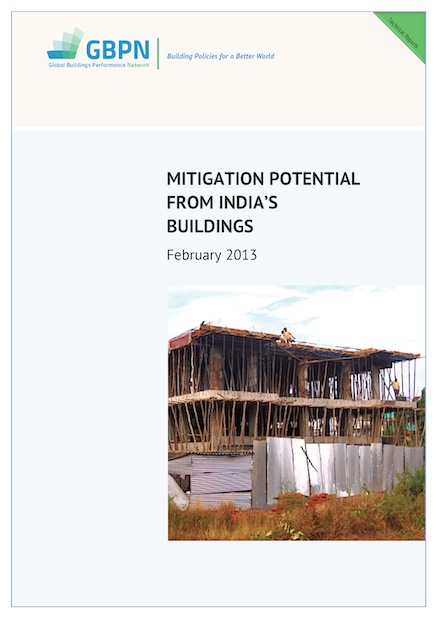 可靠证据表明,至2050年印度建筑领域会产生巨幅能源增长,基于此估测,本报告分析了印度目前建筑节能减排的政策框架及其节能潜力。
可靠证据表明,至2050年印度建筑领域会产生巨幅能源增长,基于此估测,本报告分析了印度目前建筑节能减排的政策框架及其节能潜力。
19 result(s) found
 可靠证据表明,至2050年印度建筑领域会产生巨幅能源增长,基于此估测,本报告分析了印度目前建筑节能减排的政策框架及其节能潜力。
可靠证据表明,至2050年印度建筑领域会产生巨幅能源增长,基于此估测,本报告分析了印度目前建筑节能减排的政策框架及其节能潜力。
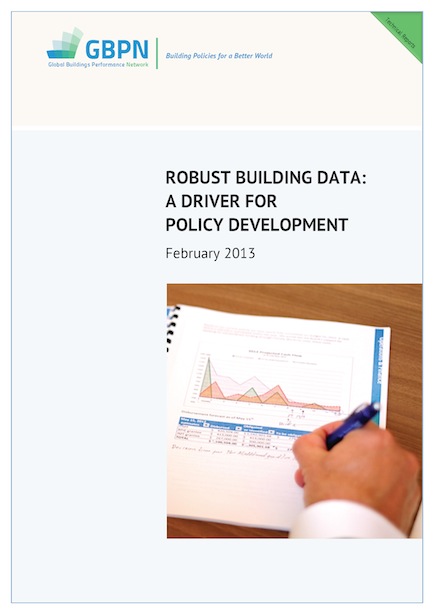 本报告就四个地区数据质量和数据的可利用性问题进行了分析,同时也提醒了我们需要完成多少工作才能建成一个强大而全面的建筑数据库,并提出了实现这个数据库的可行性建议。
本报告就四个地区数据质量和数据的可利用性问题进行了分析,同时也提醒了我们需要完成多少工作才能建成一个强大而全面的建筑数据库,并提出了实现这个数据库的可行性建议。
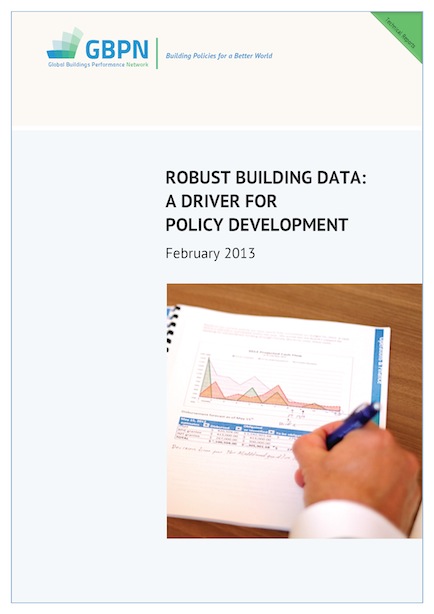 本报告就四个地区数据质量和数据的可利用性问题进行了分析,同时也提醒了我们需要完成多少工作才能建成一个强大而全面的建筑数据库,并提出了实现这个数据库的可行性建议。
本报告就四个地区数据质量和数据的可利用性问题进行了分析,同时也提醒了我们需要完成多少工作才能建成一个强大而全面的建筑数据库,并提出了实现这个数据库的可行性建议。
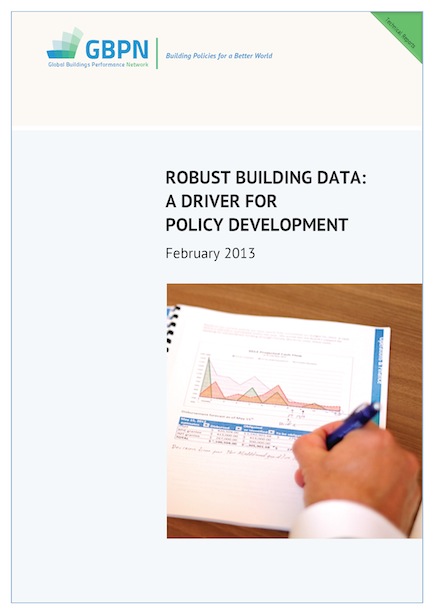 Data Annex
Data Annex
Discover where things stand regarding building energy data quality and availability in our four regions, this report reminds us of how far we have to go before a robust and comprehensive set of building data is in place and provides some recommendations of how we can get there.
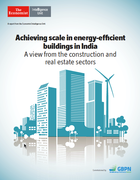 The Economist Intelligence Unit (EIU) report "Achieving scale in energy-efficient buildings in India: A view from the construction and real estate sectors" commissioned by the GBPN explains the challenges and opportunities of investing in energy efficiency in buildings in India.
The Economist Intelligence Unit (EIU) report "Achieving scale in energy-efficient buildings in India: A view from the construction and real estate sectors" commissioned by the GBPN explains the challenges and opportunities of investing in energy efficiency in buildings in India.
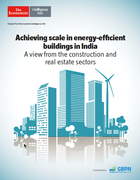 A report from the Economist Intelligence Unit (EIU), commissioned by the GBPN finds that while India’s commercial building sector has blazed the energy-effiency trail in the building sector, achieving significant scale will depend on efficiency measures becoming standard practice in the commercial middle market, retrofit and, particularly, the residential building segment.
A report from the Economist Intelligence Unit (EIU), commissioned by the GBPN finds that while India’s commercial building sector has blazed the energy-effiency trail in the building sector, achieving significant scale will depend on efficiency measures becoming standard practice in the commercial middle market, retrofit and, particularly, the residential building segment.
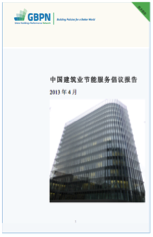 Executive Summary
Executive Summary
GBPN conducted a study on the factors affecting the use of ESCO models for the retrofit of existing buildings in China, identifying current barriers to the development of the Chinese ESCO market, while also researching best-practice examples of ESCOs globally and investigating the feasibility of introducing those examples to China.
Building energy efficiency is an important strategy for reducing greenhouse gas emissions globally. In fact, 55 countries have included building energy efficiency in their Nationally Determined Contributions (NDCs) under the Paris Agreement. This research uses building energy code implementation in six cities across different continents as case studies to assess what it may take for countries to implement the ambitions of their energy efficiency goals.
It is clear that city must be part of the solution if an urbanizing world is to grapple successfully with ecological challenges such as energy depletion and climate change. A system dynamics model was developed in this study using STELLA platform to model the energy consumption and CO2 emission trends for the City of Beijing over 2005–2030. Results show that the total energy demand in Beijing is predicted to reach 114.30 million tonnes coal equivalent (Mtce) by 2030, while that value in 2005 is 55.99 Mtce, which is 1.04 times higher than the level in 2005.
This report presents the results of a state-by-state analysis of the potential energy and cost savings from improving compliance with building energy codes to 100 percent from current levels. The report also examines 45 statewide compliance evaluation studies, providing a summary of evaluation methods and key findings. Evidence in most states indicates that staggering rates of non-compliance, as high as 100 percent in some jurisdictions, have eroded the gains from energy code development and adoption.
Contemporary societies are facing a broad range of challenges, from pressures on human health and well-being to natural capital depletion, and the security of food, water and energy. These challenges are deeply intertwined with global processes, such as climate change and with local events such as natural disasters. The EU's research & innovation (R&I) policy is now seeking to address these challenges from a new perspective, with Nature-Based Solutions, and turn them into innovation opportunities that optimise the synergies between nature, society and the economy.
Pursuing economic targets of job creation, growth, and innovation while tackling global environmental challenges, has long been seen as impossible. However, any long-term economic competitiveness and security depends on the extent to which natural resources are used sustainably. Therefore, the European Union is investing in nature-based solutions to achieve this double goal. The difference between the prevailing economic model and a sustainable resource use has long seemed insurmountable.
Nature has provided humankind with food, fuel, and shelter throughout evolutionary history. However, in contemporary cities, many natural landscapes have become degraded and replaced with impermeable hard surfaces (e.g., roads, paving, car parks and buildings). The reversal of this trend is dynamic, complex and still in its infancy. There are many facets of urban greening initiatives involving multiple benefits, sensitivities and limitations.
Nature-based solutions (NBS) are increasingly applied to guide the design of resilient landscapes and cities to enable them to reach economic development goals with beneficial outcomes for the environment and society. The NBS concept is closely related to other concepts including sustainability, resilience, ecosystem services, coupled human and environment, and green (blue) infrastructure; however, NBS represent a more efficient and cost-effective approach to development than traditional approaches.
Increasing urbanisation, changing disease scenarios, and current predictions of climate change impacts require innovative strategies for providing healthy and sustainable cities, now and in the future. The recently coined concept, Nature-based solutions (NBS), is one such strategy referring to actions that are inspired by, supported by, or copied from nature, designed to address a range of environmental challenges.
Focusing on the voluntary LEED and ENERGY STAR environmental certification schemes in the United States, we investigate whether price premiums exist across all building value categories or are localized to specific value segments. We find that the largest value building segment does not demonstrate any price premiums, while the smallest value categories do. The concentrated supply of eco-labeled offices in large, high-quality buildings likely contributes to this phenomenon.